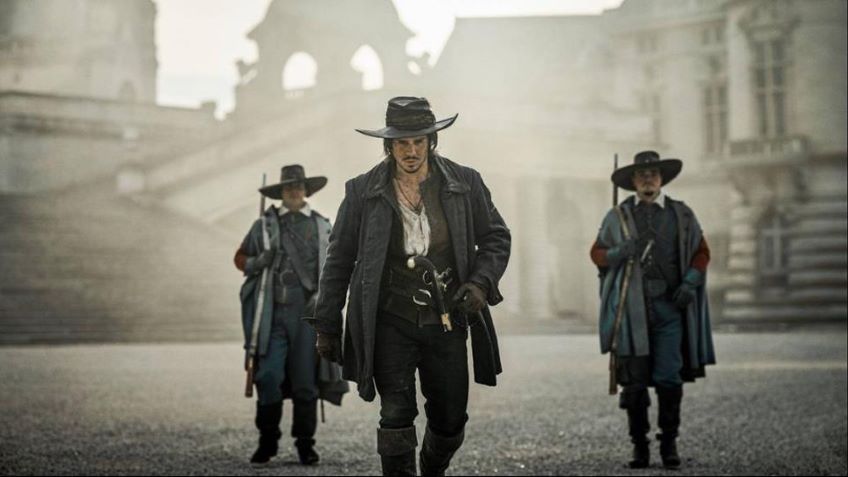Joyce Glasser reviews The Three Musketeers: Part II: Milady (December 15, 2023) Cert 12A, 114 mins.
There was a disappointing attempt in 2011 by Paul W.S. Anderson to add to the nearly 200 international films and television programmes adapted from Alexander Dumas’s two most famous books: The Count of Monte Christo and The Three Musketeers. Director Martin Bourboulon (Eiffel, Mommy or Daddy) banked on there being an audience for a big budget, star-studded version of the Musketeers to remind us that many of today’s fast-paced action films whose heroes work behind the scenes in a tight knit group inspired by swashbuckling of The Three Musketeers. And, although no British sovereign would be as involved with a James Bond operative as was King Louis XIII with his Musketeers, – he ordered them to excel with both swords and muskets, hence the name – they take their orders from both Louis and Le Capitaine de Tréville as Bond did from M. The casting of ex-Bond girl Eva Green as the spy Milady might not be pure coincidence.
Part I: d’Artagnan, appeared last April and left us on a cliff edge. As The Three Musketeers was first sold in serial form, like Dicken’s novels, there are lots of cliff hangers to keep readers hooked. Part II: Milady appears just in time to quench our thirst without the need to refresh our memories. And this richly produced historic action film, in which the love stories, like the skirmishes and battles, are so visceral they feel real, also ends on a cliff hanger.
Part I was necessarily bogged down in exposition as the characters are introduced and their relationships worked out, especially that of d’Artagnan (Francois Civil), who through courage, wit, skill, swordsmanship, and the help of Athos (Vincent Cassell), achieves his goal of becoming a King’s Musketeer at the end of the film. Part I centred around d’Artagnan’s love for Queen Anne of Austria’s lady-in-waiting, Constance Bonacieux (Lyna Khoudi), and his frantic mission to take back the diamond necklace Louis XIII’s long-suffering wife Anne (Vicky Krieps) had bestowed on her lover The Duke of Buckingham (Jacob Fortune-Lloyd) in time to save her honour. Cardinal Richelieu (Eric Ruf), whose primary objective is to ensure France’s dominance over the Habsburg empire in the Thirty Years War, engages the traitorous Milady de Winter to thwart d’Artagnan’s plan. Richelieu sees Anne – related to both branches of the Habsburg dynasty, Spain and Austria – as a threat.

In Part II, the plot thickens, the intrigues, many with historic foundations, grow more complex – a bit confusing too – and love touches all four of the Musketeers, with both humour and tragic loss. Part II centres around the Siege of La Rochelle of 1627 which Louis XIII and Richelieu order to end the Huguenot dominance of the strategic port. This main event again involves the Duke of Buckingham who sends ships in vain to support the valiant Protestants in the by-then seized city.
Shot in St Malo, the set pieces in the battles use the location to achieve remarkable authenticity, although a long hand-to-hand combat along the castle walls is hard to follow under cover of night. When, at dawn, Athos (who is Protestant) knowingly walks across the sand at low tide into a trap to save his rebellious brother tied to a post, two miracles occur that set your pulse raising.
But it is a love-hate relationship and pact of convenience that begins the film and unites d’Artagnan with his deadly enemy: Milady. D’Artagnan will do anything to find Constance, who was kidnapped at the end of Part I and Milady seems to hold a clue. There’s a window of opportunity to see another side to Milady, particularly when she removes her wig and you realise that that long, romantic hair was never going to be as practical for a woman on the move. That interlude doesn’t last long and it’s probably a step too far when she throws herself on the new Musketeer, half her age. He only has eyes for Constance, but there are other parts of his body to deal with.
The film’s other love-hate relationship is a spoiler. The Musketeers, like MI6 operatives, act independently, and keep secrets about themselves from the other Musketeers, even if they always have each other’s back. Athos, who is really Le Comte de la Fère, gets the spotlight here when he returns to his chateau to check up on his lonely son living in seclusion with his faithful housekeeper. Athos was inspired by Comte Amand Athos, who died when he was 28, but might have been the oldest Musketeer, as they were recruited as teenagers. Luckily for us, Cassell’s noble, melancholy Musketeer lives on to pursue his vendetta with his rejected wife.

Sisterly love touches the stylish Artemis (Romain Duris from The Beat that My Heart Skipped) who is protective of his pretty sister (Camille Rutherford), a nun. Given Artemis’s devotion to the Church, this is not all that surprising. What is surprising is that this nun is pregnant and the soldier she has fallen for is not the marrying kind. Here, portly Porthos (Pio Marmai), so obsessed with trying to make himself look noble, comes to the rescue and realises that love is in the eye of the beholder.
Last, but not least, is the versatile Louis Garrel (Redoubtable, The Dreamers) who reappears as a slightly more confident Louis XIII. The king is insecure for several reasons, and Garrel captures his imposter syndrome – his mother wanted Louis’s brother to be king – and incorporates his suspicion of the people he should trust most, Richelieu, his brother and Anne, into his gestures and body language.
Louis was a horrible husband (Anne was childless for sixteen years, before delivering two sons) and a dubious ruler. His decision to recant on the Edict of Nantes and take on the Habsburgs led to costly years of bloodshed. But Richelieu and Louis, who created the Académie Française, were Catholic nationalists, who destroyed the nobility to centralise power around the king, and established the king as absolute monarch, a tradition his son, “the sun king” would perfect.
Though Dumas was the grandson of a cruel aristocratic slave owner and his Afro-Caribbean mistress, he was a generous, brilliant, bon vivant whose plays and then novels were so successful that he built himself a theatre and a chateau with the profits, only to lose both within a few years. When Louis-Napoleon Bonaparte came to power in 1851, Dumas travelled widely, living in Russia and then Italy where he ran a newspaper that supported Italian unification. He was an adventurer who used his pen to imagine the lives of those who lived by the sword.
Dumas would appreciate how Bourboulon leaves us, in a whirlwind, longing to see how all pieces will fall into place.




